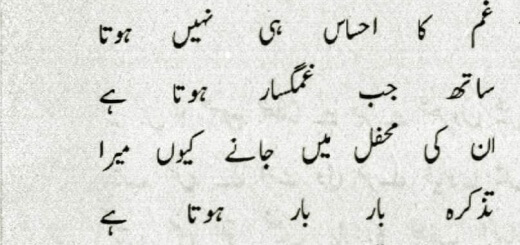Faiz Ahmad Faiz – A Blameworthy Sufi? – By Asif Naqshbandi
A Translation of Faiz’s Last Poem
works translated into Russian, and a recipient of the USSR’s equivalent of the Nobel Peace Prize, the Lenin Prize, at heart he still remained loyal, deep down, to his land and its culture and roots. A large part of the culture of Panjab, from whose heartlands he hailed, a son of Sialkot (like Iqbal before him), is connected to the mystical aspects of Islam known as tassawuf in Arabic and Sufism in English and central to orthodox Sufi Islam is the belief in the intercession of the Sultan of Madina for the sinner. Every poet of note in Islamic history has sung of his hope that the Medinan Prophet would intercede for his sins before God and the poets of the Panjab are no exception. From Baba Fariduddin Ganj e Shakar to Sayyid Mihr Ali Shah, the Panjabi Sufis have poured their sorrows out to the Messenger of Allah. Faiz, too, did the same, though it may come as a surprise to many of his erstwhile admirers.
The Urdu poet Ashfaq Ahmad, in his preface to one of Faiz’s poetry collections, described him as a “malamati Sufi”. These were a group of Sufi Muslims in the classical age of Sufism, in the Middle East, who affected an apparent disobedience to the Sacred Law to prevent others from thinking of them as being pious. They felt it would be good for their efforts in trying to quell the demands of their carnal, sin-inducing souls (nafs), if people spoke badly of them. Hence the name for themselves: Malamaati-the Blameworthy Ones.
This naat is the last poem in the Collected Works of Faiz Ahmad Faiz, arguably the greatest Urdu poet since World War Two. It is therefore, possibly, the last poem he ever wrote. He usually wrote in classical, highly polished Urdu, but for this address to the Messenger he turned–for some reason–to Farsi. Perhaps he felt it is more dignified.
The transliteration and translation (literal):
Ay tu keh hast har dil-i mahzoon saraa-ye tu
Aavardeh-am saraa-ye digar az baraa-ye tu
Oh Thou whose home is every melancholy heart
I have brought other homes too just for thy sake
Khwajeh beh takht bandah-i-tashveesh-i-mulk-o-maal
Bar khaak rashk-i khosraw-i-dawraan gadaa-ye tu
The rulers on their thrones are slaves to anxiety of land and wealth
Upon the dusty earth, Oh envy of the rulers of the age, is thy mendicant!
Aanjaa qasida-khwaani-ye-lazzaat-i seem o zarr
Eenjaa faqt hadees-i nishaat-i laqaa-ye tu
There are odes in praise of the pleasures of silver and gold
Here, only the tradition of the joy of thy countenance
Aatish-fashaan zi qahr o malaamat zabaan-i shaykh
Az ashk-i-tarz-i-dard-i-ghareebaan radaa-ye tu
The fire-breathing tongue of the shaykh speaks of terror and reproach
From the tears of the way of pain of the poor, is thy cloak!
Baayad keh zulmaan-i jehaan ra sadaa konad
Roozi ba-soo-ye adl o inaayat sadaa-ye tu!
This sinner of the world will definitely cry out
On a Day when for justice and grace there is only thy cry!













